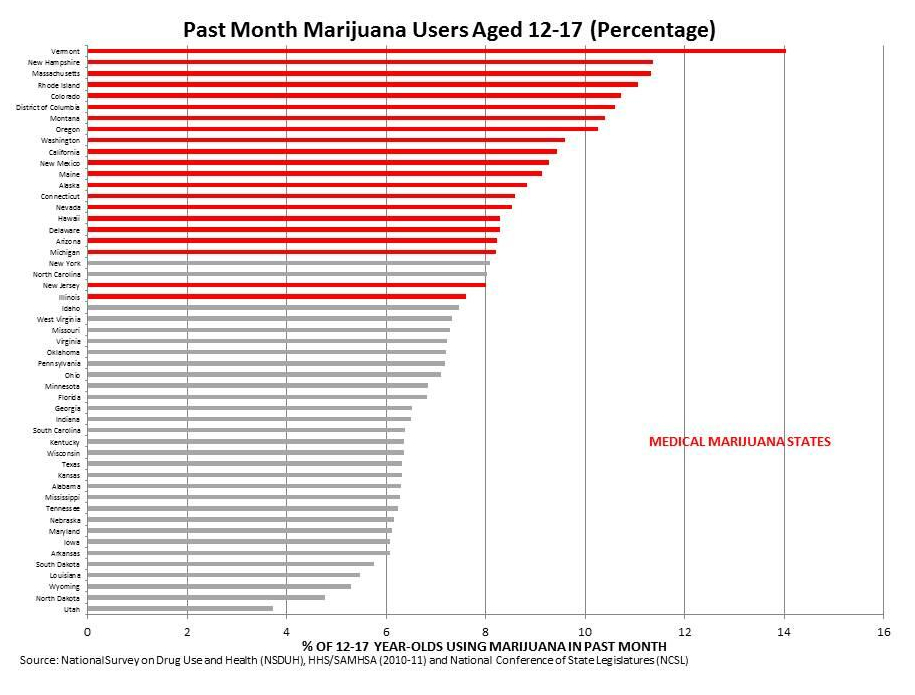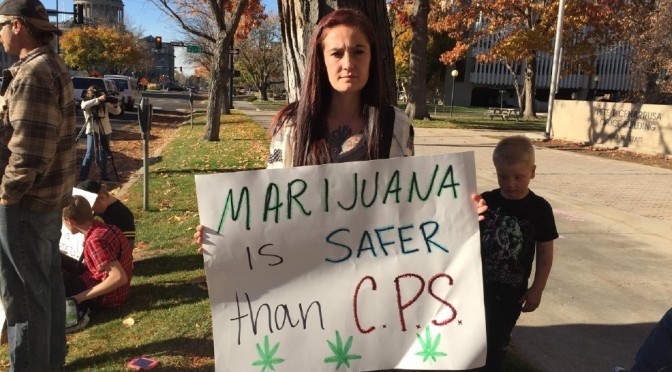Editor’s Note: There is much misunderstanding about “medical” marijuana. National Families in Action explains when a controlled substance becomes medicine. NFIA has also published some helpful leaflet on the difference between marijuana and “medical” marijuana.
It’s hard to protect kids when the names of medical marijuana dispensaries are so enticing. The stores using “health,” “wellness,” “medicinal” and “candy” in their titles make pot very alluring. Imagine if a liquor store, tobacco store, or pharmacies did the same. (See our investigation into medi-pot dispensaries.)
In states with medical marijuana, 12-17 year-old teens use marijuana to a much greater degree than in states without medical marijuana. States that voted down medical marijuana, Arkansas and South Dakota, have some of the lowest rates of youth marijuana usage. Before legalization in Colorado, a study showed that more than half the teen users surveyed said they had obtained pot from a medical marijuana ‘patient’.
Parents Opposed to Pot calls on those who support medical marijuana to address how to prevent substance abuse and secondary sales to children. The best laws have been adopted by state legislatures, as in New York and New Jersey. Whenever there have been statewide votes, as in California, Oregon, Washington, and Colorado, the records for protecting children are poor.
Teen usage has been going up since 1996, when medical marijuana was voted upon in the 1st state, California. Additionally, the teen perceptions of the risks in using marijuana have been going steadily downward since the 1991. Certain states with medical marijuana, especially Vermont, Oregon and Colorado, also have some of the highest usage of opiate pills, cocaine and alcohol in children and adults. It looks like marijuana is the gateway drug, when comparing state statistics for marijuana usage with all other drug usage. Vermont has been having a heroin problem this year, and Oregon has had problems with pill abuse over the past several years.
Testing and Approval of Drugs
As Americans have learned to expect easy, medicinal solutions to complex problems, the prescription drug and medical marijuana industries have grown.
While it is completely understandable that somebody that is sick, or the family of a patient, will want to use any means necessary to ease the pain and to cure, we would hope that there would be the correct information out there necessary to make a sound decision about the pros and cons of use.
Pharmaceutical drugs must undergo rigorous testing by the Food and Drug Administration (FDA) before approval. During these tests, placebos can work almost as well as the drugs being tested. Approved pharmaceutical drugs must warn of any and all potential side effects.
On the other hand, marijuana is recommended without warnings, and providers often do not need to prove their qualifications. Claims of cures by medical marijuana are promoted without testing. The marijuana plant holds 480 chemical components. If one component holds curative properties, another component could work against that property or have negative side effects.
Even if marijuana helps Multiple Sclerosis (MS), it also increases the brain fog in MS in patients. Why aren’t we discussing side effects when we talk medical marijuana? According to former Congressman Patrick Kennedy of Project SAM, the Institute of Medicine has concluded that if there is a future for marijuana as medicine, it lies in isolated components.
Epidiolex, a derivative of CBD in liquid form, is available to children with epilepsy in 10 states. It is being fast-tracked for FDA-approval, along with Sativex for Multiple Sclerosis. Sativex, a derivative of marijuana will be used for as a tongue spray. Both products were developed by GW Pharmaceuticals of Great Britain.
Conventional and Alternative Medicine
Getting a dog has been shown to be a very good solution for those who suffer from Post-Traumatic Stress-Syndrome (PTSD). Both yoga and dogs can bring back connectivity, open up energy and free blocked emotions. Quite the opposite could occur with use of marijuana. It may bring relief by numbing feelings even more, but it is known to harm memory and may not allow PTSD survivors a recovery back to their prior state of functioning.
There are problems with conventional treatments for cancer, but there are also problems with alternative treatments for cancer. The marijuana lobby has yet to explain why marijuana is often not the drug of choice for cancer patients in medical marijuana states. Is it because there are better drugs out there? Marinol, a synthetic marijuana, has been available to address the nausea and vomiting from cancer treatments and AIDs.
In Montana a few years ago, Cashy Hyde’s father claimed to have cured his son of cancer using cannabis oil. Sadly, the boy eventually died, after dramatic announcements that he had been cured. The constant nurture and love from his parents probably helped to extend his life. Any parent may have tried the same thing, maybe preferring it over harsh chemotherapy treatments.
When reading about the remarkable claims advocates of medical marijuana propose, please remember the placebo effect. We don’t know why placebos cure some people and not others. It could be the power of belief, or the result of a person’s own immune system having the ability to fight the disease.
Diet change can treat many of the autoimmune diseases which medical marijuana advocates list as conditions to be treated with marijuana: Crohn’s Disease, Rheumatoid Arthritis and Multiple Sclerosis. Medical marijuana treatments address the symptoms of disease, rather than the underlying causes. Diet and environmental changes can bring us closer to addressing the root causes of autism, autoimmune disease and epilepsy.
The ketogenic diet is a very successful means of controlling Dravet’s Syndrome and other types of epilepsy in children, a fact not discussed by those advancing medical marijuana.
Sometimes psychiatric medications are blamed for the actions of disturbed mass killers, such as Adam Lanza. However, James Holmes, Jared Loughner and Johar Tsarnaev were heavy marijuana users. Even the recent Santa Barbara killer, Elliot Rodger, had made a video about using marijuana every day.
We do not know the extent to which marijuana or pharmaceutical drugs contribute to teen violence. While the pharmaceutical industry has flaws, at least rigorous testing is required. The government has the ability to take a drug off the market.
Where’s the Expertise?
In this day and age, when people want miracles and pharmaceutical drugs can fall short of expectations, the marijuana industry looks for potential openings.
All claims of marvelous, miraculous cures need to be viewed with skepticism, whether considering pharmaceutical medicine or marijuana as medicine.
The push to reschedule marijuana from a schedule I to schedule II drug comes from Rick Doblin, the same person who wanted the FDA to approve MDMA (Ecstasy) as medicine. Doblin holds a PhD in Political Science. He doesn’t have the credentials you’d expect from someone making medical judgments.
The designation of marijuana as a Schedule I drug, meaning “high probability of abuse,” was upheld by the Federal Appeals Court for the DC Circuit, on January 22, 2013. Three pot advocacy groups had appealed a Food and Drug Administration (FDA) ruling of July 8, 2011, a ruling backed up by evidence by the Department of Health and Human Services. Previous reviews were in 1972 and 1986. Pot has become more potent since that time. There were 455,000 hospital emergency room visits for marijuana in 2011, a reason the FDA and Health and Human Services are reluctant to change.
The decision-making should come from the health and medical professions, using their expertise, not from political advocates.
Most doctors don’t agree with medical marijuana, but some see isolated components of the plant most helpful . The Pro-Con website lists 105 double-blind studies, and the conclusions from these studies are inconclusive: 40% suggest it can be helpful, 30% find no possible medical usage and 30% find it neither favorable or unfavorable.
If your state has a referendum, study the details. How does it protect children and prevent profiteering in the secondary markets?



